FREE FRUITION IN THE LITERARY TEACHING: EDUCATIONAL ADAPTATIONS AND CONTRADICTIONS AT BNCC
Abstract
In this article, we seek to reflect the literary idleness in the classroom, based on literary fruition in the final grades of Elementary School II. From this theme, we aim at the possibility of free literary fruition, through the “Shared Reading”, we will try to specify the potential that the students have for the contribution of the literary treatment in the school environment. Our writing is bibliographical and we aim at studies by thinkers who contributed to the structuring of epistemological thinking in the area of teaching literature (COSSON 2010), (DURÃO, 2017), (LARROSA, 1999), (SUTTANA, 2013), among others. Therefore, we will outline the opening of literary education to the free fruition of the students, observing the literary adjustments and contradictions built in the Common National Curriculum Base (BNCC).
Downloads
References
CANDIDO, Antonio. O direito à literatura. In: Vários escritos. 4. ed. São Paulo/Rio de Janeiro: Duas Cidades/Ouro sobre azul, 2004, p. 169-191.
CHARTIER, Roger. Inscrever e apagar: cultura escrita e literatura, séculos XI-XVIII. Tradução: Lusmara Curcino Ferreira. São Paulo: Editora Unesp, 2007.
COSSON, Rildo. A prática da leitura literária na escola: mediação ou ensino?. Nuances: estudos sobre Educação, v. 26, n. 3, p. 161-173, 2015.
________. Letramento literário: teoria e prática. Editora Contexto, 2010.
DA GLÓRIA BORDINI, Maria; DE AGUIAR, Vera Teixeira. Literatura: a formação do leitor; alternativas metodológicas. Mercado Aberto, 1988.
DUMAZEDIER, Joffre. Sociologia Empírica do Lazer. Trad.: Sílvia Mazza e J. Guinsburg. São Paulo: Perspectiva, 2008.
DURÃO, Fabio. Da intransitividade do ensino de literatura. Matraga-Revista do Programa de Pós-Graduação em Letras da UERJ, v. 24, n. 40, 2017.
ELIAS, José. Literatura infantil: ler, contar e encantar crianças. Porto Alegre: Mediação, 2017.
LAJOLO, Marisa; ZILBERMAN, Regina. A formação da leitura no Brasil. São Paulo: Editora UNESP, 2020.
LARROSA, Jorge. O enigma da infância ou o que vai do impossível ao verdadeiro. In: Pedagogia profana: danças, piruetas e mascaradas. Trad. Alfredo Veiga-Neto. Belo Horizonte: Autêntica, 1999. p. 183-198.
SOARES, Magda. A escolarização da literatura infantil e juvenil. In: EVANGELISTA, Aracy Alves Martins; BRANDÃO, Heliana Maria Brina; MACHADO, Maria Zélia Versiani (organizadores). Escolarização da leitura literária. 2ª ed., 3ª reimp. Belo Horizonte: Autêntica, 2011.
SUTTANA, Renato. Um problema de formação: reflexões sobre literatura, leitura e ensino. Leitura: Teoria & Prática, v. 29, n. 57, p. 66-77, 2011.
TODOROV, Tzvetan. A leitura como construção. In: Os gêneros do discurso. São Paulo: Editora Unesp, 2018.
VEBLEN, Thorstein. A Teoria da Classe Ociosa: um estudo econômico das instituições. Trad.: Olívia Krähenbül. Ed.: Nova Cultural, 1988.
WAGNER, Roy. Símbolos que representam a si mesmos. São Paulo: Editora Unesp, 2017.
The publication Caletroscopio shall retain for a period of three years all authorial rights for works accepted for publication: articles, reviews, translations, etc. Outside this restriction, these works are licenced through Licença Creative Commons-Atribuição-NãoComercial-SemDerivações 4.0 Internacional.
Upon expiry of this period, in the event that the author publishes the text, even when making alterations to the original, we would ask authors to include as a footnote, the information that a previous version of the article was published in the Revista Caletroscópio, citing the appropriate references.


